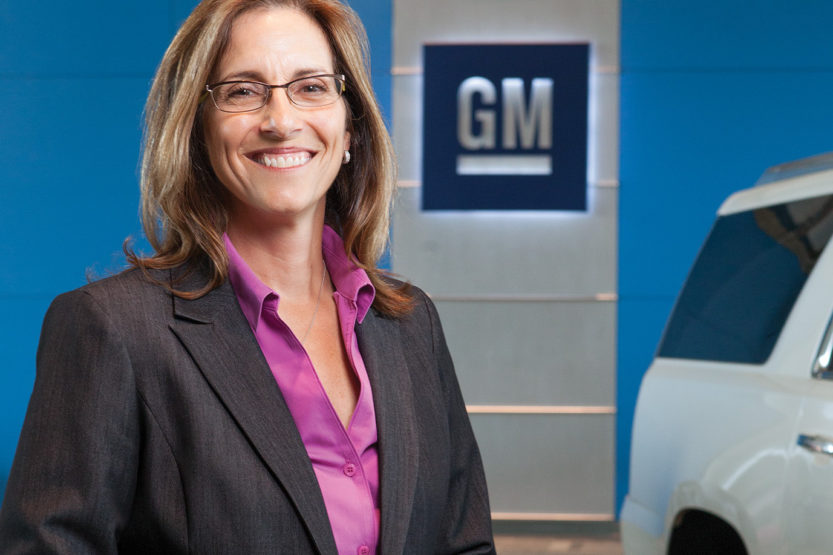Alumni Interview: Mari Kay Scott
 “My job is demanding and rewarding, much like one of my favorite pastimes—golf,” says GM executive Mari Kay Scott ’84 ENG (Image by Tom McKenzie)
“My job is demanding and rewarding, much like one of my favorite pastimes—golf,” says GM executive Mari Kay Scott ’84 ENG (Image by Tom McKenzie) I grew up in Chicago in a family of educators. Like a lot of people applying to college, I didn’t know what to choose as my major. “You like math and science,” my mom said. “Why don’t you put down ‘engineering?’” The more I thought about it, the more I liked the idea. Once I arrived, I realized how male-dominated engineering was, but I had two brothers, so that didn’t scare me. The course work, however, was extremely difficult. I called my mom after my first calculus test, crying because I was sure I was flunking out of school. Once the grades were posted, I was amazed to see that I passed by the skin of my teeth with a “D.” And so I kept at it. Eventually, it got easier. I found subjects that were interesting, but challenging. I liked learning about systems. I liked solving problems.
When I was a senior, General Motors recruited on campus. I was hired as a college graduate-in-training and began my first assignment at a GM truck plant in Pontiac, Mich. I wasn’t really much of a car person growing up, but the plant was equipped with automated processes and robots. It was cutting-edge, and I was ecstatic at the opportunity to work with such interesting technology. I guess GM liked what they saw, because after six months, they offered me the position of maintenance supervisor on the second shift. Although I was nervous, I knew the job had previously been held by a woman, so I thought, “If one woman could do the job, so could I.”
Everything was new to me—from the machinery and processes to union rules and regulations. What I think guided me through the learning curve was being genuine, and treating the employees around me the way I would expect to be treated. Of course, using humor helps. Admitting that you don’t have all the answers helps. Recognizing people for doing a good job and buying coffee helps. I remember one of the workers asking, “You mean you don’t know how to clean a paint booth?’’ I could tell he was testing me. “Clean one?’’ I responded. “I’ve never even seen one.’’ But I was willing to work and willing to learn, and we all got along well.
[At the U of I] I found subjects that were interesting, but challenging. I liked learning about systems. I liked solving problems.
That was the first of many positions I held at GM plants, and at each one, I learned something new that proved useful at the next stop. In 2001, after 17 years working in plants, I moved on to GM’s worldwide facilities group. The challenge of working across continents, across cultures, and with different laws, customs and priorities became enormously complex.
My current role as executive director of global environmental compliance and sustainability has been tremendously interesting and fun. The road GM has taken to shake its image—the big industrial corporation that makes those “things” that run on fossil fuel—has been difficult, but the company is committed to being a leader in sustainability.
Our approach to sustainability is to strengthen our company while building stronger communities and a better world through improved mobility. We know our customers care about more than cars. They care about how we build them and how we engage with the world around us.
For example, we operate 122 landfill-free facilities and aspire to be a completely zero-waste manufacturer. Last year, we ended the use of coal as an energy source in our North American plants. We continue to invest in renewable energy around the world. In fact, we now use 105 megawatts of renewables—up from 66 MW last year.
We believe we’re part of the solution to climate change. We’re the only automaker to sign the Ceres BICEP Climate Declaration stating that addressing climate change presents economic opportunity.
Our 216,000 employees operate with a sustainability mindset. We’re committed to serving and improving our communities. I am proud that my team is a part of all this work.
My job is demanding and rewarding, much like one of my favorite pastimes—golf. As a golfer, my goal is to play on all the great courses in the world. But apart from a couple courses in Scotland, I have not been able to work in too many visits, even with all my traveling for GM. My point is that I have learned a lot from golf—perseverance, discipline and fallibility. Most importantly, I have learned that I have the ability to improve, and that’s a valuable lesson no matter how you learn it.

